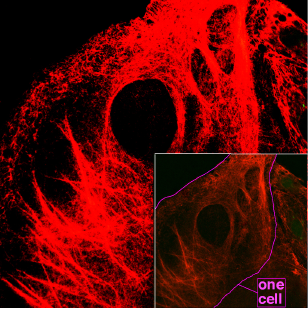Related Research Articles

Keratin is one of a family of structural fibrous proteins also known as scleroproteins. Alpha-keratin (α-keratin) is a type of keratin found in vertebrates. It is the key structural material making up scales, hair, nails, feathers, horns, claws, hooves, and the outer layer of skin among vertebrates. Keratin also protects epithelial cells from damage or stress. Keratin is extremely insoluble in water and organic solvents. Keratin monomers assemble into bundles to form intermediate filaments, which are tough and form strong unmineralized epidermal appendages found in reptiles, birds, amphibians, and mammals. Excessive keratinization participate in fortification of certain tissues such as in horns of cattle and rhinos, and armadillos' osteoderm. The only other biological matter known to approximate the toughness of keratinized tissue is chitin. Keratin comes in two types, the primitive, softer forms found in all vertebrates and harder, derived forms found only among sauropsids.

Keratin 6A is one of the 27 different type II keratins expressed in humans. Keratin 6A was the first type II keratin sequence determined. Analysis of the sequence of this keratin together with that of the first type I keratin led to the discovery of the four helical domains in the central rod of keratins. In humans Keratin 6A is encoded by the KRT6A gene.
Type II keratins constitutes the Type II intermediate filaments (IFs) of the intracytoplasmatic cytoskeleton, which is present in all mammalian epithelial cells. The type 2 cytokeratins consist of basic or neutral, high molecular weight proteins which in vivo are arranged in pairs of heterotypic Type I and Type II keratin chains, coexpressed during differentiation of simple and stratified epithelial tissues. It has been seen that Type II Keratins are developed before Type 1 keratins during human embryonic development.

Keratin, type I cytoskeletal 19 also known as cytokeratin-19 (CK-19) or keratin-19 (K19) is a 40 kDa protein that in humans is encoded by the KRT19 gene. Keratin 19 is a type I keratin.

Keratin 16 is a protein that in humans is encoded by the KRT16 gene.

Keratin 6C, is a type II cytokeratin, one of a number of isoforms of keratin 6 encoded by separate genes located within the type II keratin gene cluster on human chromosome 12q. This gene was uncovered recently by the Human Genome Project and its expression patterns in humans remains unknown.

Keratin, type II cuticular Hb1 is a protein that in humans is encoded by the KRT81 gene.

Keratin, type I cuticular Ha1 is a protein that in humans is encoded by the KRT31 gene.

Keratin, type II cuticular Hb6 is a protein that in humans is encoded by the KRT86 gene.

Keratin, type II cytoskeletal 78 is a protein that in humans is encoded by the KRT78 gene.

Keratin, type I cuticular Ha3-II is a protein that in humans is encoded by the KRT33B gene.

Keratin, type I cuticular Ha2 is a protein that in humans is encoded by the KRT32 gene.

Keratin, type I cuticular Ha3-I is a protein that in humans is encoded by the KRT33A gene.

Keratin, type I cuticular Ha4 is a protein that in humans is encoded by the KRT34 gene.

Keratin, type II cuticular Hb5 is a protein that in humans is encoded by the KRT85 gene.

Keratin, type I cuticular Ha6 is a protein that in humans is encoded by the KRT36 gene.

Keratin 83, also known as KRT83, is a protein which humans is encoded by the KRT83 gene.
KRT72 is a keratin gene. It is responsible for hair formation, and it encodes a protein present in the inner root sheath of hair follicles.

KRT71 is a keratin gene. Keratins are intermediate filament proteins responsible for the structural integrity of epithelial cells and are subdivided into epithelial keratins and hair keratins. This gene encodes a protein that is expressed in the inner root sheath of hair follicles. The type II keratins are clustered in a region of chromosome 12q13.

Keratin 37 is a protein that in humans is encoded by the KRT37 gene. KRT37 is a member of the keratin gene family.
References
- ↑ "KRT73 Gene(Protein Coding) - Keratin 73, Type II". GeneCards. Retrieved April 2, 2016.
- ↑ "UniProtKB - Q86Y46 (K2C73_HUMAN)". UniProt. Retrieved April 2, 2016.
- ↑ "KRT73 keratin 73 [Homo sapiens (human)]". NCBI . Retrieved April 2, 2016.